#Hernia surgery in Vadodara
Explore tagged Tumblr posts
Text
Best Hernia Surgery in Vadodara at Narayan Smruti Multispeciality Hospital

Experience the best hernia surgery in Vadodara at Narayan Smruti Multispeciality Hospital! Our expert surgeons utilize minimally invasive techniques for faster recovery and less pain. Get a personalized treatment plan and compassionate care throughout your journey. Link: https://www.nsmhospital.org/contact/
0 notes
Text
Laparoscopic surgery for Hernia: How does it compare to conventional surgery
Laparoscopic surgery for hernia is a minimally invasive surgery in which a laparoscope (a thin telescope-like instrument with a camera and light attached at the end) is used to execute the procedure. This video guides the surgeon on his movements, providing the surgeon with better control throughout the procedure.
Read the Full Blog -
0 notes
Text
Understanding the Role of Critical Care Teams in ICU Recovery
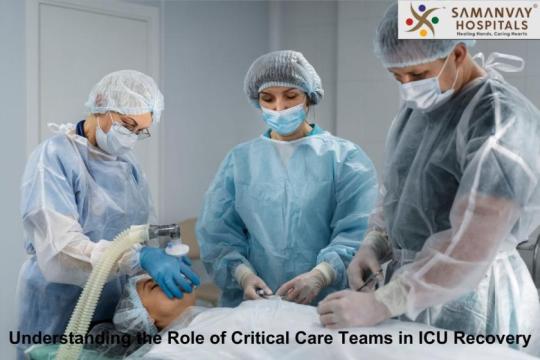
When patients are critically ill or injured, they need specialized care. This is where the critical care team in the Intensive Care Unit (ICU) steps in. The ICU is designed to provide round-the-clock monitoring and treatment. These teams are crucial for improving patient outcomes and helping them recover.
What is a Critical Care Team?
A critical care team is the amalgamation of the most expert medical professionals. The team may comprise doctors, nurses, respiratory therapists, and others. The aim of a particular member is to play their part in recovering a patient, making them stabilize a patient in their care at a critical time with comprehensive treatment.
Key Responsibilities of Critical Care Teams
Critical care teams monitor patients’ vital signs, administer medication, and operate more advanced machinery, such as devices that can detect heart rate, oxygen level, and blood pressure. Furthermore, the team should ensure timely intervention to avert further complications from arising in a patient’s case.
Doctors in the ICU monitor the condition of the patient. They will change the treatment plan if there is a reaction from the patient. Moreover, the nurses consult with doctors regarding the progress of the patient.
Importance of Specialized ICU Care
In an ICU, every patient is different in their condition. The critical care team is well prepared to take on a myriad of medical emergencies. They can treat each patient uniquely according to his or her needs. For instance, when a patient is diagnosed with respiratory failure, the respiratory therapist is involved in aiding him or her in breathing treatment.
Besides the recovery in terms of the body, it is also not restricted to physical care. It encompasses emotional and mental health recovery as well. The critical care team communicates with the patient’s family members to update them on their condition and to allay fears.
How Critical Care Teams Assist in ICU Recovery?
Critical care teams play a pivotal role in a patient’s recovery. They stabilize patients and make sure they receive proper treatments at the right time. This is especially important in intensive care units, where patients are at high risk.
For all patients requiring 24×7 emergency ICU services, the critical care team is available round-the-clock. They will respond promptly to changes in the patient’s condition and, therefore, bring timely intervention. Their expertise will also avoid complications and lead to faster recovery.
ICU Services in Baroda: A Great Model
In Baroda, there are the best ICU facilities in various hospitals. State-of-the-art infrastructure and very skilful teams deliver the highest standard of care for patients here. Whether surgery is being recovered from or in a state of emergency, all medical conditions will be handled professionally in Baroda’s critical care departments.
However, the best ICU care Vadodara hospitals ensures that every patient gets individualized treatment. The units are well equipped with the latest technology to monitor patients closely. This way, patients receive constant supervision, which increases chances for recovery.
Coordination Among Team Members
In an intensive care unit hospital, collaboration is the key. Every team member, whether a doctor or a nurse, works together seamlessly. Their combined efforts create a comprehensive care plan for the patient. Moreover, they ensure that the patient’s recovery is on track and intervene when necessary.
As an example, if a patient is having trouble breathing, the respiratory therapist collaborates with doctors. Together, they give appropriate treatments so the patient’s state is stabilized.
Challenges Facing the ICU Team
Despite the advanced technology, recovery in the ICU is challenging. Critical care teams have to constantly adjust treatment plans because patients’ conditions change. Additionally, the emotional toll on patients and their families is significant. The team provides support to families, ensuring they are informed and involved in the recovery process.
However, the high-pressure situation needs to be balanced with calm decision-making. In this regard, ICU teams are always prepared for any emergency and act quickly. This calls for constant training and up-to-date knowledge of medical procedures.
Conclusion
Critical care teams are the cornerstone of recovery from the ICU. They provide focused care to stabilize patients in critically ill conditions. Whether it’s ICU services in Baroda or the best ICU care in Vadodara, these teams provide the best medical care to a patient. Due to their special expertise and devotion, critical care teams play an important role in enhancing patient results in patients who recover faster.
Therefore, when seeking an intensive care unit hospital or 24×7 emergency ICU services, select a facility with experienced and compassionate critical care teams. Their role is crucial in ensuring your loved one receives the best care during difficult times.
#heart hospital in vadodara#best cardiologist in vadodara#urologist in vadodara#top 10 hospitals in vadodara#top 10 multispeciality hospitals in vadodara#multispeciality hospital in baroda#best urologist in vadodara#Internal medicine specialist Baroda#Best ICU care Vadodara#ICU services in Baroda#hernia surgery specialist Baroda#surgery of hernia in vadodara#laparoscopic hernia surgery in vadodara#best urology hospital in vadodara#heart specialist hospital in vadodara#best cardiology doctor in vadodara#best heart hospital in vadodara#top urologist in vadodara#best cardiac surgeon in vadodara#lungs hospital in vadodara#gynecologist hospital in vadodara#general surgery hospital Vadodara#Fissure treatment in Vadodara#best gynecologist in vadodara#24x7 emergency ICU services#orthopedic hospital in Vadodara#Top orthopedic hospital Vadodara#urologist hospital in vadodara
0 notes
Text
Best Incarcerated Hernia Surgery Doctors In Vadodara | Vigos hospital
Vigos hospital provides Best Incarcerated Hernia Surgery In Vadodara. We offer high-quality hernia surgery services in Vadodara, performed by experienced and skilled surgeons. Our advanced surgical techniques ensure minimal discomfort and faster recovery for our patients. With state-of-the-art facilities and personalized care, we strive to provide the best possible outcome for individuals seeking hernia surgery in Vadodara.
0 notes
Text
Laparoscopic hernia surgery in vadodara
1 note
·
View note
Text
https://meddco.com/packages/Vadodara/Inguinal-Hernia-Hernioplasty
Inguinal Hernia Surgery Cost In Vadodara-Meddco
Compare the price for Inguinal Hernia Surgery and find the specialist doctor in Vadodara. Get the best Inguinal Hernia Surgery for at affordable price in Vadodara and book an appointment on our website meddco.com
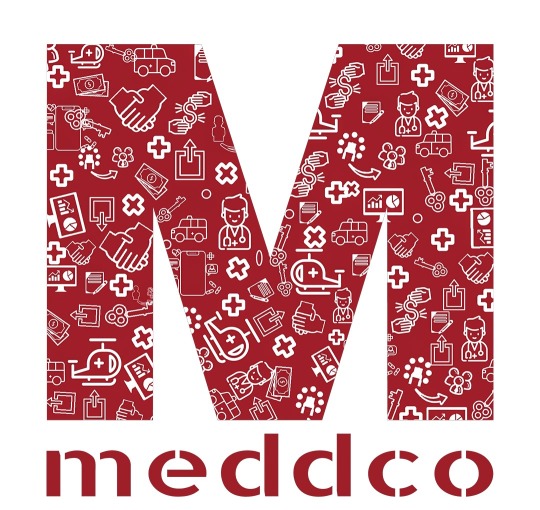
0 notes
Text
Inguinal Hernia Hernioplasty Surgery Cost In Vadodara
0 notes
Link
Having an uncomfortable belly bulge? Our Doctors offers Best Hernia Treatment Surgery in Vadodara. Consult Click2Cure Best Laparoscopic Surgeons In Vadodara.
1 note
·
View note
Text
Use of Laparoscopic Surgery in the Treatment of Digestive Disorders
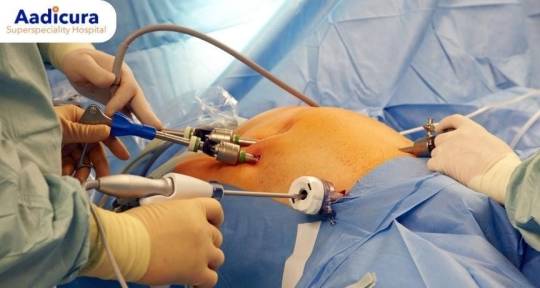
Laparoscopic surgery, also known as minimally invasive surgery, has revolutionized the field of digestive disorder treatment in recent years. This technique involves making small incisions in the abdomen and using specialized instruments and a camera to perform surgery. Aadicura Superspeciality Hospital is considered as one of the Best Laparoscopic Surgery Hospital in Vadodara. In this article, we will discuss the use of laparoscopic surgery in the treatment of various digestive disorders.
Gallbladder Surgery: Laparoscopic cholecystectomy is a common surgical procedure that involves removing the gallbladder. This procedure is often performed to treat gallstones, which is nowadays a common condition affecting the digestive system. Laparoscopic cholecystectomy has become the gold standard for the treatment of gallbladder disease because it is associated with less pain, smaller incisions, and faster recovery times.
Hernia Repair: A hernia occurs when an organ or tissue protrudes through a weakened area in the abdominal wall. Laparoscopic hernia repair is a minimally invasive surgical procedure that involves using a small camera and specialized instruments to repair the hernia. This procedure is associated with smaller cuts, less pain, faster recovery times, and fewer complications than open hernia repair.
Reflux Surgery: Gastroesophageal reflux disease (GERD) is a common digestive disorder that occurs when stomach acid flows back into the esophagus, causing heartburn and other symptoms. Laparoscopic reflux surgery, also known as fundoplication, is a surgical procedure that involves wrapping the upper part of the stomach around the lower esophageal sphincter to prevent stomach acid from flowing back into the esophagus. This procedure is effective in treating GERD which doesn’t respond to other non surgical treatment options. This procedure is associated with less pain, faster recovery times, and also fewer complications than traditional open surgery.
Colorectal Surgery: Laparoscopic surgery is also used to treat colorectal disorders such as colon cancer, diverticulitis, and inflammatory bowel disease. This procedure involves using a small camera and specialized instruments to remove a portion of the colon or rectum. Laparoscopic colorectal surgery is associated with smaller incisions, less pain, less blood loss, faster recovery times, and fewer complications than open surgery when performed by the Best Laparoscopic Surgeon in Vadodara at Aadicura Superspeciality Hospital.
Bariatric Surgery: Laparoscopic bariatric surgery is a minimally invasive surgical procedure that is used to treat obesity. This procedure involves reducing the size of the stomach, which helps patients lose weight by limiting the amount of food they can eat. Laparoscopic bariatric surgery is associated with less pain, faster recovery times, reduced scarring, and fewer complications than traditional open surgery.
In addition to these procedures, laparoscopic surgery is also used to treat other digestive disorders such as pancreatic cancer, liver cancer, and spleen disorders. The benefits of laparoscopic surgery over traditional open surgery are clear. Our expert team of the most experienced and the Best Gastro Surgeons in Vadodara is dedicated to deliver the highest quality treatment and support for a range of digestive disorders and conditions.
FAQ’S
What is laparoscopy of the digestive system?
Laparoscopy of the digestive system, also known as laparoscopic surgery or minimally invasive surgery, is a type of surgical procedure that involves the use of a small camera and specialized instruments to perform surgery on the digestive system through small incisions in the abdomen. The camera provides a high-definition view of the surgical site, which is projected onto a monitor, allowing the surgeon to perform the procedure with precision and accuracy. Aadicura Superspecialist Hospital has The Best Laparoscopic Surgeons in Vadodara, who have expertise in the surgical field.
Laparoscopy of the digestive system can be used to diagnose and treat a wide range of digestive disorders, including gallbladder disease, hernias, reflux disease, colorectal disorders, and obesity.
What is the benefit of laparoscopic surgery?
Laparoscopic surgery, also known as minimally invasive surgery, offers several benefits over traditional open surgery. Some of the main benefits include:
Less Pain: Laparoscopic surgery is associated with less pain than open surgery, as it involves smaller incisions and less tissue trauma.
Faster Recovery: Laparoscopic surgery typically involves a shorter hospital stay and a faster recovery time than open surgery.
Reduced Scarring: The small incisions used in laparoscopic surgery result in smaller scars than those from open surgery, which can be especially important for cosmetic reasons.
Reduced Risk of Infection: The risk of infection is lower with laparoscopic surgery, as the smaller incisions mean that there is less exposure of the internal organs to the external environment.
Improved Accuracy: The use of a camera and specialized instruments in laparoscopic surgery allows for better visualization of the surgical site and greater precision during the procedure.
Reduced Blood Loss: Laparoscopic surgery typically results in less blood loss than open surgery, which can reduce the need for blood transfusions and other interventions.
What are the various surgeries for digestive problems?
There are several types of surgical procedures that may be used to treat digestive problems, depending on the specific condition and its severity. Some common examples include:
✔ Gallbladder Surgery: Gallbladder surgery, also known as cholecystectomy, is a procedure used to remove the gallbladder in cases of gallstones or other problems with the gallbladder.
✔ Hernia Repair: Hernia repair surgery is used to treat a hernia, which occurs when an organ or tissue protrudes through a weak spot in the surrounding muscle or connective tissue.
✔ Bariatric Surgery: Bariatric surgery, also known as weight loss surgery, is used to help people who are severely overweight or obese to lose weight and improve their overall health.
✔ Bowel Resection: Bowel resection is a procedure used to remove a portion of the large or small intestine in cases of cancer, inflammatory bowel disease, or other conditions.
✔ Esophageal Surgery: Esophageal surgery may be used to treat conditions such as gastroesophageal reflux disease (GERD) or oesophageal cancer.
✔ Pancreatic Surgery: Pancreatic surgery may be used to treat conditions such as pancreatic cancer or chronic pancreatitis.
Who needs laparoscopic surgery?
A good candidate for laparoscopic surgery is typically a patient who has a medical condition that can be effectively treated with this type of minimally invasive surgery. An expert gastro surgeon is someone who will be able to diagnose whether someone needs or is a good candidate for laparoscopic surgery. Some factors that may make a patient a good candidate for laparoscopic surgery include:
1. The nature of the medical condition: Laparoscopic surgery is often a good option for conditions that involve the abdomen, such as gallbladder disease, hernias, and colorectal disorders. The specific medical condition and its severity will determine whether laparoscopic surgery is a good option.
2. The patient’s general health: Patients who are generally healthy and do not have significant underlying medical conditions are often good candidates for laparoscopic surgery. However, patients with certain medical conditions, such as heart disease or lung disease, may not be good candidates for this type of surgery.
3. The patient’s age: Laparoscopic surgery can be performed on patients of all ages, from infants to elderly adults. However, older patients may be more likely to have underlying health issues that could make them a poor candidate for surgery.
4. The size and location of the organs or tissues being operated on: Laparoscopic surgery is often best suited for organs or tissues that are relatively small and accessible. If the organs or tissues are too large or located in a difficult-to-reach area, open surgery may be a better option.
5. The patient’s preferences: Some patients may prefer laparoscopic surgery over open surgery because of the smaller incisions, reduced pain, and faster recovery time associated with this type of surgery. Patient preferences and comfort level should be taken into account when determining the best course of treatment.
6. Overall, the decision to perform laparoscopic surgery should be made on a case-by-case basis in consultation with a qualified medical professional, taking into account the patient’s individual needs and medical history.
We at Aadicura Superspeciality Hospital being one of the Best Gastro Hospital in Vadodara strive to provide comprehensive and compassionate care for all our patients. We’re committed to providing exceptional care and support to every patient who walks through our doors. Contact us today to schedule an appointment and take the first step towards better digestive health.
0 notes
Text
Awareness of Trauma Care Surgery and Elective Care Surgery
Surgeries can be scary but most people go through at least a couple of surgeries in their lifetime. But no surgery is simple or without risk. You always need to ensure that your doctor and surgeon are very capable and sure of what they are setting out to do. Emergency surgeries are as the name implies
Trauma care surgery is the specialisation of surgery that treats traumatic injuries caused often by impact like traffic accidents, falls, sports, crush injuries, etc. Elective surgeries are surgeries that can be pre-scheduled.
Trauma Care Surgery
Trauma surgeons include a large team of specialised doctors from different branches of medicine like orthopedic, neurosurgery, cardio, plastic surgery, etc. These surgeries cannot be postponed and should be taken care of immediately without spending any time. Trauma surgeons are usually given training after their basic medical degree.
The first step of trauma care is identifying injuries caused to the head and neck, abdominal area, chest, legs, feet, arms and hands. The key priorities of trauma surgery are bringing back the patient’s consciousness and stabilising their condition. Once the surgeons can attain that, they will go for definitive surgical therapy.
Trauma surgeons might use radiographic X-rays, CT scans, MRIs, etc., to analyze the severity of damage caused to the internal organs and hemorrhaging. Basic details of the patient, like the patient’s vital signs, age, history or pre-existing conditions, etc., are also recorded during the admission.
Elective Care Surgery
Elective care surgeries are those surgeries that can be scheduled beforehand but that doesn’t mean they aren’t important. These surgeries are non-emergency surgeries that are medically necessary. Elective surgeries and cosmetic surgeries are different. However, elective surgeries can include cosmetic surgeries too. Sometimes elective surgeries are carried out for serious conditions like hernia surgery, kidney stones or appendix removal, etc.
Elective surgeries are important as they improve the overall health of patients. Elective surgeries are taken care of by a team of doctors and health care professionals and are decided based on the patient and the procedure. It might include a radiologist, pathologist, nutritionist and other support required for the procedure. These surgeries are sometimes “same-day” surgeries.
If elective surgeries are postponed due to unforeseen circumstances, you can talk to the health care professionals about the procedures to follow and then act accordingly.
BAGH is one of the best hospitals in Vadodara, Gujarat, that offers both trauma surgeries and elective surgeries. BAGH offers 24*7 comprehensive services for patients suffering from life-threatening diseases, and that’s how BAGH has become the best trauma care centre in Vadodara.
Whether elective or trauma surgeries, BAGH, being the finest trauma care centre in Vadodara, Gujarat, has got skilled and experienced doctors and efficient and dedicated staff to take care of the patients.
1 note
·
View note
Text
Best General Surgery Hospital in Vadodara
General surgery is a surgical specialty that focuses on surgery of abdominal contents including esophagus, stomach, small bowel, colon, liver, pancreas, gallbladder and bile ducts, and often the thyroid gland (depending on local reference patterns). They also deal with diseases involving the skin, breast, soft tissue, trauma, peripheralvascular surgery and hernias
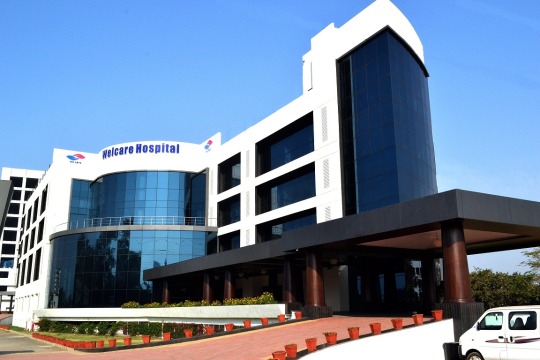
Sub-specialities:
1. Laparoscopic surgery This is a relatively new speciality dealing with minimal access techniques using cameras and small instruments inserted through 0.3 to 1 cm incisions. Robotic surgery is now evolving from this concept. Gallbladders, appendices, and colons can all be removed with this technique. Hernias are now repaired mostly laparoscopically. Most bariatric surgery is performed laparoscopically.
2. Colorectal surgery
General surgeons treat a wide variety of major and minor colon and rectal diseases including inflammatory bowel diseases (such as ulcerative colitis or Crohn’s disease), diverticulitis, colon and rectal cancer, gastrointestinal bleeding and hemorrhoids.
3. Breast surgery
General surgeons perform a majority of all non-cosmetic breast surgery from lumpectomy to mastectomy, especially pertaining to the evaluation and diagnosis, of breast cancer.
4. Endocrine surgery
General surgeons are trained to remove all or part of the thyroid and parathyroid glands in the neck and the adrenal glands just above each kidney in the abdomen.
5. Vascular surgery General surgeons can perform vascular surgery if they receive special training and certification in vascular surgery. However, general surgeons are capable of treating minor vascular disorders.
6. Surgical oncology Surgical oncologist refers to a general surgical oncologist (a specialty of a general surgeon), but thoracic surgical oncologists, gynecologist and so forth can all be considered surgeons who specialize in treating cancer patients. The importance of training surgeons who sub- specialize in cancer surgery lies in evidence, supported by a number of clinical trials, that outcomes in surgical cancer care are positively associated to surgeon volume—i.e., the more cancer cases a surgeon treats, the more proficient he or she becomes, and his or her patients experience improved survival rates as a result. A surgeon who performs a given operation more often, will achieve superior results when compared with a surgeon who rarely performs the same procedure.
7. Transplant surgery Responsible for all aspects of pre-operative, operative, and post-operative care of abdominal organ transplant patients. Transplanted organs include liver, kidney, pancreas, and more rarely small bowel.
PLASTIC SURGERY:
Aesthetic surgery Aesthetic surgery is an essential component of plastic surgery and includes facial and body aesthetic surgery. Plastic surgeons use cosmetic surgical principles in all reconstructive surgical procedures as well as isolated operations to improve overall appearance.
Craniofacial surgery Craniofacial surgery is divided into pediatric and adult craniofacial surgery. Pediatric craniofacial surgery mostly revolves around the treatment of congenital anomalies of the craniofacial skeleton and soft tissues, such as cleft lip and palate, craniosynostosis, and pediatric fractures. Adult craniofacial surgery deals mostly with fractures and secondary surgeries (such as orbital reconstruction) along with orthognathic surgery. Craniofacial surgery is an important part of all plastic surgery training programs, further training and subspecialisation is obtained via a craniofacial fellowship.
Hand surgery Hand surgery is concerned with acute injuries and chronic diseases of the hand and wrist, correction of congenital malformations of the upper extremities, and peripheral nerve problems (such as brachial plexus injuries or carpal tunnel syndrome). Hand surgery is an important part of training in plastic surgery, as well as microsurgery, which is necessary to replant an amputated extremity. The Hand surgery field is also practiced by orthopedic surgeons and general surgeons. Scar tissue formation after surgery can be problematic on the delicate hand, causing loss of dexterity and digit function if severe enough. There have been cases of surgery to women’s hands in order to correct perceived flaws to create the perfect engagement ring photo.
Burn surgery Burn surgery generally takes place in two phases. Acute burn surgery is the treatment immediately after a burn. Reconstructive burn surgery takes place after the burn wounds have healed.
Pediatric plastic surgery Children often face medical issues very different from the experiences of an adult patient. Many birth defects or syndromes present at birth are best treated in childhood, and pediatric plastic surgeons specialize in treating these conditions in children. Conditions commonly treated by pediatric plastic surgeons include craniofacial anomalies, cleft lip and palate and congenital hand deformities.
Microsurgery Microsurgery is generally concerned with the reconstruction of missing tissues by transferring a piece of tissue to the reconstruction site and reconnecting blood vessels. Popular subspecialty areas are breast reconstruction, head and neck reconstruction, hand surgery/replantation, and brachial plexus surgery To know more, visit www.welcarehospital.co.in
1 note
·
View note
Text
Benefits of Laparoscopic Surgery

Gujarat Kidney Hospital, Vadodara has on offered excellent laparoscopic facilities for all patients. This hospital offers laparoscopic surgery for diseases of a wide range of organs like abdomen colon, appendix, oesophagus, glands, gallbladder, hernia, pancreas, intestines, spleen, and stomach. The hospital has a dedicated special department for patients seeking laparoscopic treatments.
Visit us: https://www.gujaratkidneyhospital.com/benefits-of-laparoscopic-surgery/
0 notes
Text
Top Tips to Prevent Piles and Other Anorectal Disorders

Hemroids, popularly known as piles, are pervasive and distressing conditions that occur due to swelling of blood vessels present in the anus or lower rectum. However, this leads to different manifestations ranging from moderate discomfort to severe itching and bleeding. While there are various methods to keep these and other anorectal conditions away, this blog shares some simple tips to avoid such conditions and lead a healthy lifestyle. For more details, visit https://samanvayhospital.com/top-tips-to-prevent-piles-and-other-anorectal-disorders/
#heart hospital in vadodara#best cardiologist in vadodara#urologist in vadodara#top 10 hospitals in vadodara#top 10 multispeciality hospitals in vadodara#multispeciality hospital in baroda#best urologist in vadodara#Internal medicine specialist Baroda#Best ICU care Vadodara#ICU services in Baroda#hernia surgery specialist Baroda#surgery of hernia in vadodara#laparoscopic hernia surgery in vadodara#best urology hospital in vadodara#heart specialist hospital in vadodara#best cardiology doctor in vadodara#best heart hospital in vadodara#top urologist in vadodara#best cardiac surgeon in vadodara#24x7 emergency ICU services#top 10 cardiologist in vadodara#Best endocrinologist in Vadodara#Top 10 urologist in Vadodara#top orthopedic hospital in vadodara#knee specialist in vadodara#best hospital for hernia surgery#Critical Care Hospital in Vadodara#Kidney stone treatment in vadodara#Laser treatment for piles#intensive care unit hospital in vadodara
0 notes
Text
Best Hernia Surgeon Doctors in Vadodara | Vigos hospital
The best hernia surgeons in Vadodara Vigos hospita are renowned for their expertise and advanced surgical techniques. These highly qualified professionals specialize in diagnosing and treating various types of hernias, ensuring optimal patient outcomes. Utilizing state-of-the-art technology and minimally invasive procedures, they prioritize patient safety and comfort. With a commitment to personalized care, these surgeons provide comprehensive treatment plans tailored to individual needs, making them a trusted choice for hernia surgery in the region.
0 notes
Text
Managing Heart Disease in Diabetic Patients A Complete Guide
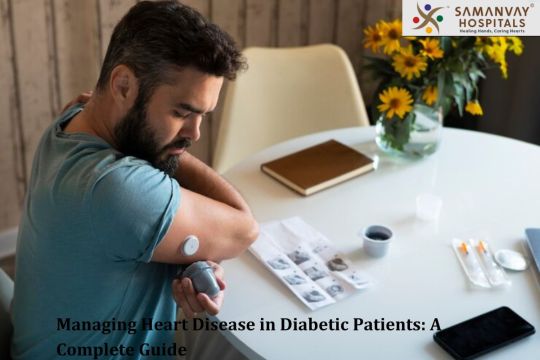
Diabetes and heart disease often go hand in hand. The risks for heart disease are higher for diabetic patients because of the imbalance of blood sugar. However, if managed appropriately, the risks can be minimized. This guide will help you understand how to manage heart disease in diabetic patients effectively.Understanding the Connection Between Heart Disease and Diabetes
Diabetes results in high blood sugar levels that eventually damage blood vessels. Over time, it will increase the chance of heart disease. Diabetic patients are also more likely to develop other conditions such as high blood pressure, high cholesterol, and fatty deposits in arteries. Therefore, the early detection and treatment of such conditions are critical.Important Considerations in Treating Heart Diseases in Diabetic Patients
In diabetic patients, heart disease has to be taken care of. Furthermore, these factors are vital in improving the health condition in general.
Control Blood Sugar Levels
Managing blood sugar levels is an important step. It reduces the risk of heart disease if the blood glucose level is kept under control. It is essential to monitor blood sugar regularly. To know more, speak with an internal medicine specialist Baroda.
Maintain Healthy Blood Pressure
High blood pressure can worsen heart disease. Diabetic patients should maintain their blood pressure level in the normal range. Control of blood pressure can be achieved through regular exercise, a balanced diet, and medication prescribed by a physician.
Lower Cholesterol Levels
Diabetes often raises bad cholesterol, or LDL, and lowers the good, or HDL, cholesterol. Effective management of cholesterol levels can prevent further complications with heart disease. Control is achieved using prescriptions and diet modification, such as reduction in trans fats.
Healthy Diet and Lifestyle Changes
A heart-healthy diet and lifestyle are indispensable for diabetic patients. Moreover, these can work wonders to benefit one’s heart health as well as general health.
Eat a Balanced Diet
Diets that consist of a high number of fruits and vegetables, whole grains, and lean proteins will help a lot in diabetes control and heart disorders. Limit consumption of processed food, sugary snacks, and fried foods. Replace these with good fats, olive oil, and nuts.
Regular Exercises
Regular physical activity helps regulate blood sugar levels and strengthens the heart. A minimum of 30 minutes of moderate exercise most days of the week is recommended. Additionally, walking, swimming, and cycling are excellent choices. Exercise also reduces stress, another factor that can affect heart health.
Avoid Smoking and Limit Alcohol
Smoking and alcohol intake above recommended limits are some factors that may pose a risk for heart disease. Quitting smoking and alcohol restriction are essential practices in managing heart disease. The physician can give support and additional resources to assist with quitting smoking.
Regular Checkups and Professional Guidance
Diabetic patients must have regular check-ups. Probably visiting a heart hospital in Vadodara would ensure early detection of any heart-related issues. Even routine check-ups give your doctor a chance to adjust medicines and treatment plans as needed.
See a Heart Specialist
If you have diabetes, then visit a heart specialist hospital in Vadodara because heart specialists are trained to handle certain risk factors diabetes might pose towards the heart. A heart specialist would give you personalized care to work with both conditions together.
Work with Your Healthcare Team
It is a team effort to manage diabetes and heart disease. Work closely with your primary care doctor or cardiologist and other specialists. They will develop an integrated plan of care respecting specific medical needs.
Importance of Medication and Treatment
Medication plays a key role in managing both diabetes and heart disease. Your doctor may prescribe medications to control blood sugar, cholesterol, and blood pressure. However, it’s important to take these medications as prescribed and attend regular follow-ups.
Insulin and Diabetes Medications
Diabetic patients need insulin or oral medications to regulate blood sugar. It would require following the prescription given by your doctor regarding insulin administration. Additionally, other medications may be prescribed for effective control of your blood sugar levels.
Cardiovascular Medications
Medications that include blood thinners, statins, and beta-blockers are also prescribed, which manage heart conditions and prevent complications from occurring. Proper consultation with the best cardiology doctor in Vadodara would ensure that the right medication is prescribed.
Conclusion
A comprehensive management approach is followed in the management of heart disease in patients with diabetes. It involves regular monitoring, proper diet, regular physical activity, and strict adherence to medication. However, working with a network of healthcare workers, including an internal medicine specialist in Baroda and a heart specialist, reduces risks and helps improve your quality of life.
Act today to safeguard your heart and manage diabetes well. Consult with experts who can direct you to a healthier life by visiting a heart hospital in Vadodara for personal advice
#heart hospital in vadodara#best cardiologist in vadodara#urologist in vadodara#top 10 hospitals in vadodara#top 10 multispeciality hospitals in vadodara#multispeciality hospital in baroda#best urologist in vadodara#Internal medicine specialist Baroda#Best ICU care Vadodara#ICU services in Baroda#hernia surgery specialist Baroda#surgery of hernia in vadodara#laparoscopic hernia surgery in vadodara#best urology hospital in vadodara#heart specialist hospital in vadodara#best cardiology doctor in vadodara#best heart hospital in vadodara#top urologist in vadodara#best cardiac surgeon in vadodara#24x7 emergency ICU services
0 notes
Text
How High Cholesterol Affects Your Heart: Symptoms, Risks, and Solutions
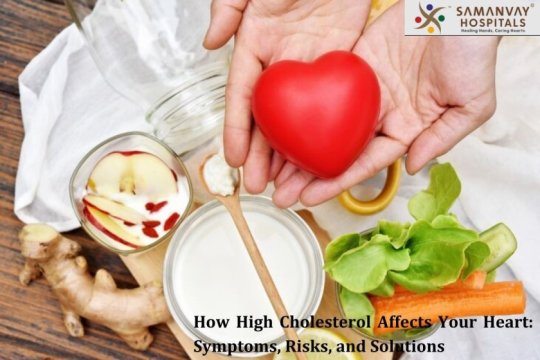
Cholesterol is one of the fatty substances found in your blood. Your body indeed needs some cholesterol, but excess levels pose a danger to your health. Excessive levels of cholesterol can contribute to heart disease, one of the most fatal causes of death throughout the entire world. Below is a blog to elaborate on how high cholesterol impacts your heart, symptoms, risks, and potential remedies.
What Is Cholesterol?
Cholesterol circulates within your blood as two types of cholesterol. It includes the bad cholesterol, identified as low-density Lipoprotein, which gathers itself into your inner lining on the walls of your arteries to make them reduce and make the blood harder to go through. High-density lipoprotein, termed good cholesterol, ensures it is much easier to break down LDL.
Symptoms of High Cholesterol
High cholesterol is usually asymptomatic. It is often referred to as a “silent” condition. You may not know you have it until it leads to severe heart problems like a heart attack or stroke. Thus, regular checkups are essential to monitor cholesterol levels.
However, some individuals may experience chest pain or shortness of breath. These symptoms usually occur when a blockage in the arteries reduces blood flow to the heart.
How does high cholesterol affect your heart?
High cholesterol damages your heart in multiple ways. It causes aggregation of plaque along your arteries known as atherosclerosis. Due to time factors, the aggregate plaque hardens and compaction further reduces your blood flow into your heart due to the poor delivery of your necessary oxygen and other nutrients.
Clots of blood may be formed as the plaque bursts. The clots may block the artery fully and result in a heart attack. Also, high cholesterol increases the possibility of developing high blood pressure. This would once again increase the burden on your heart.
Risks of High Cholesterol
High cholesterol is a significant risk factor for serious heart conditions. It leads to coronary artery disease, in which the arteries that supply blood to the heart become blocked. If left untreated, it can lead to heart attacks, strokes, and heart failure.
People with high cholesterol normally develop plaque deposits that cause a restriction of blood flow to important organs. Additionally, high cholesterol may lead to the development of peripheral artery disease, where the arteries in your legs become narrowed. This might lead to a painful condition when walking or moving.
High cholesterol makes blood vessels less elastic. As a consequence, it leads to high blood pressure, putting more pressure on the heart to pump blood. This load, over time, can weaken the heart muscle.
Solutions for High Cholesterol
High cholesterol is treated by a combination of lifestyle and medical treatment. The following are ways to reduce cholesterol levels and keep your heart healthy:
Dietary Care
The consumption of smaller amounts of saturated fats and fibre-rich diets would help in bringing down cholesterol. Fruits, vegetables, whole grains, and lean proteins would be your dietary intake. A diet rich in omega-3 fatty acids – fish – ensures the healthiness of your heart.
Exercise Frequently
Physical activity may also increase HDL cholesterol and reduce LDL levels. Engage in at least 30 minutes of moderate exercise most days of the week. This can help improve overall heart health and reduce the risk of heart disease.
Quit Smoking and Limit Alcohol
Smoking destroys blood vessels, and hence chances of developing heart disease. Smoking cessation enhances heart health as the cholesterol level will also come down. Besides these, alcohol is consumed responsibly so that it might maintain the balance of cholesterol levels in the body.
Take Medication
Lifestyle modifications may not always be helpful. Cholesterol-reducing drugs called statins may also reduce high cholesterol levels. The course of treatment shall be prescribed by your doctor only.
Regular Tests
Only by regular monitoring of cholesterol can one prevent heart disease. Many heart specialists, such as the best heart hospital in Vadodara, offer routine cholesterol screening and treatment options.
When to See a Doctor?
If you are having symptoms like chest pain, shortness of breath, or dizziness, it is a must to seek medical attention right away. If you are experiencing symptoms associated with heart problems, a heart specialist hospital in Vadodara can provide immediate care for you.
Besides, if you have a family history of heart disease or cholesterol level, then consult your doctor and talk about routine tests for the cholesterol level. The best cardiology doctor in Vadodara can give specific advice depending on your health condition.
24×7 Emergency ICU Services
A 24×7 emergency ICU services should be accessed in case of a heart emergency. It saves lives and prevents serious damage to the heart by acting quickly. Many hospitals in Vadodara provide round-the-clock services to handle urgent heart conditions.
Conclusion
High cholesterol is one of the major risk factors for heart disease. However, with the right lifestyle choices, regular check-ups, and using the right medications, you can take care of your cholesterol and prevent heart disease. However, if you feel that you may have high cholesterol or there is a history of heart disease in your family, then consult the best cardiologist in Vadodara for early detection and treatment. The sooner you are diagnosed and begin the treatment, the healthier your heart will be in the long run.
#heart hospital in vadodara#best cardiologist in vadodara#urologist in vadodara#top 10 hospitals in vadodara#top 10 multispeciality hospitals in vadodara#multispeciality hospital in baroda#best urologist in vadodara#Internal medicine specialist Baroda#Best ICU care Vadodara#ICU services in Baroda#hernia surgery specialist Baroda#surgery of hernia in vadodara#laparoscopic hernia surgery in vadodara#best urology hospital in vadodara#heart specialist hospital in vadodara#best cardiology doctor in vadodara#best heart hospital in vadodara#top urologist in vadodara#best cardiac surgeon in vadodara#24x7 emergency ICU services
0 notes